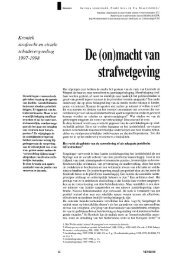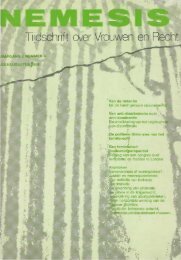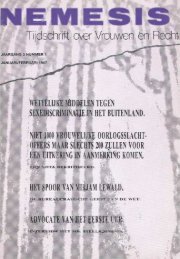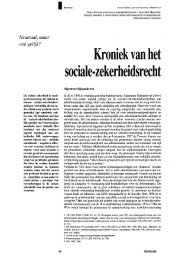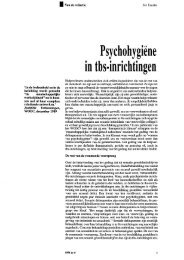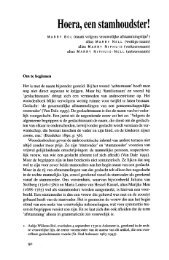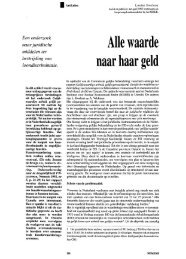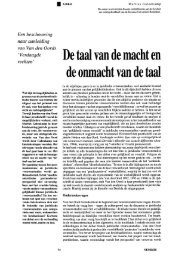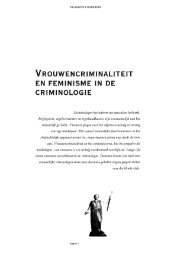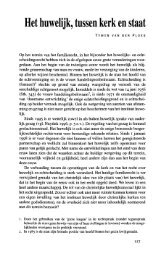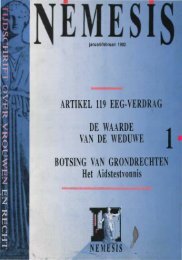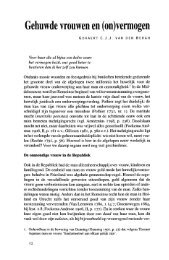(2003) nummer 3 mei/juni - Nemesis
(2003) nummer 3 mei/juni - Nemesis
(2003) nummer 3 mei/juni - Nemesis
Create successful ePaper yourself
Turn your PDF publications into a flip-book with our unique Google optimized e-Paper software.
claim that they lack the power or the<br />
right to interfere with the private sector<br />
or with the internal affairs of e.g. political<br />
parties. As parties to the Convention<br />
States have the obligation to ensure<br />
that women have equal rights in all<br />
spheres of social, cultural, political and<br />
economie life. Consequently, freedom<br />
of contract and the freedom of private<br />
or political parties to choose their own<br />
internal regulations are not per se adequate<br />
arguments to refrain from taking<br />
TSMs. Non-state organisations and institutions<br />
have to respect the non-discrimination<br />
principle and can not stay<br />
inactive as to the improvement of the<br />
position of women and the achievement<br />
of the necessary social and cultural<br />
change. The GR should underline<br />
that the Convention demands that<br />
States guarantee that private organisations,<br />
enterprises and political parties<br />
are each accountable for their discriminatory<br />
and exclusionary practices. 19<br />
VIII Article 4(1) in the reporting<br />
procedure<br />
First the GR should clarify that the<br />
Committee requires that States report<br />
(under article 2 of the Convention) on<br />
all national legislation applicable to<br />
TSMs. This includes answers to such<br />
basic and important questions as: Are<br />
such measures allowed under the Constitution<br />
or national law, and if so under<br />
what conditions? Are these measures<br />
mandatory, and if so, how is this obligation<br />
imposed and/or legally enforced?<br />
In fact, the GR should contain the recommendation<br />
that national Constitutions<br />
(ör other national legislation)<br />
should at least contain a clause that authorises<br />
TSMs. Preferably, the Constitution<br />
or the equal rights law should go<br />
further and makes TSMs obligatory<br />
when circumstances so require in order<br />
to fully embrace the Convention's<br />
obligations.<br />
Although TSMs can be reported either<br />
under Article 4(1) or under other relevant<br />
substantive article(s), the participants<br />
of the expert meeting expressed a<br />
preference for reporting on TSMs under<br />
each of the substantive provisions.<br />
Such reporting would ensure a greater<br />
degree of compliance with the Convention.<br />
The GR should set the Standard for the<br />
kind of information that the Committee<br />
wants to receive with respect to TSMs<br />
in the Country Reports. A State should<br />
report about:<br />
— the nature of the situation of women,<br />
or a specific group of women, that the<br />
government aims to address with<br />
WETGEVING<br />
TSMs; the government should provide<br />
specific data about this situation;<br />
- the plan of action, explaining why<br />
these specific measures are deemed appropriate<br />
and necessary to improve this<br />
situation;<br />
- the degree of participation of women<br />
or women's NGOs in designing, implementing<br />
and monitoring the measures;<br />
- an explanation of why the TSMs are<br />
deemed as instrumental and effective<br />
in the light of the goal of improving the<br />
de facto position of women;<br />
- the specific goals and targets of the<br />
measures at stake and the time schedule<br />
set to meet them;<br />
- the way in which the implementation<br />
of the plan and its effects are monitored;<br />
- an explanation of the relationship<br />
between general non-temporary measures<br />
and the necessity of TSMs.<br />
Within the Government, the drawing<br />
up, implementation, monitoring and<br />
enforcement of TSMs should be assigned<br />
to an institution that has expertise<br />
in the field of women' s rights and<br />
gender issues. This independent institution<br />
should have a strong mandate to<br />
gather (statistical) materials necessary<br />
to design the plan, to evaluate the results<br />
and to call all parties involved (including<br />
government agencies) to account.<br />
At all levels of this process,<br />
women's NGOs and/or representatives<br />
of the (groups of) women that are targeted<br />
with a specific TSM should be<br />
actively involved.<br />
IX Examples of TSMs in practice<br />
There was consensus in the expert<br />
meeting that TSMs can have different<br />
contents - according to the context for<br />
which they are designed and applied<br />
and the specific situation of the targeted<br />
group(s) of women - and are not restricted<br />
to the most common example<br />
of affirmative action schemes in the<br />
sphere of paid employment. The actual<br />
situation in each country regarding the<br />
de facto political, economie and social<br />
situation will determine what kind of<br />
measures are appropriate and necessary<br />
in each field covered by the Convention.<br />
There has been considerable debate in<br />
the expert meeting over whether the<br />
GR should contain an examination of<br />
all the Articles of the Convention with<br />
respect to the question whether TSMs<br />
would be appropriate and necessary<br />
and what examples of (different forms<br />
of) TSMs could be given in any specific<br />
field. Several factors militate against<br />
the use of such specific examples.<br />
One problem is that it is quite difficult<br />
to describe concrete examples in each<br />
and every field covered by the Convention.<br />
This may be due to the fact that increasing<br />
participation of women or the<br />
redistribution of power and resources<br />
to women is not always directly at<br />
stake. TSMs are only a useful mechanism<br />
when groups of women can be<br />
targeted and when the government has<br />
both the concrete power and sufficient<br />
resources to implement such measures.<br />
A second problem is that a list of examples<br />
may actually limit the possibilities<br />
that States might otherwise entertain.<br />
The debate should be on the substantive<br />
parts of the GR and not on a nonexhaustive<br />
list of possible solutions.<br />
Above it has been said that each TSMprogram<br />
ought to be evaluated against<br />
the background of the specific situation<br />
in the country that has developed the<br />
program and in the light of the problems<br />
that it intends to address. Providing<br />
a set of specific examples in the GR<br />
might be seen as contrary to this guideline.<br />
A better approach might be for the<br />
CEDAW-Committee to initiate a separate<br />
informational campaign about<br />
'best practices' in the field of TSMs.<br />
The Committee could set up a special<br />
section on its web-site, containing examples<br />
from the Country Reports,invïting<br />
input from NGOs and governments<br />
and open for discussion about<br />
these plans.<br />
The GR might also merely offer a limited<br />
number of examples from the<br />
Country Reports that have been submitted<br />
to the Committee. An evaluation<br />
of such examples in the light of the<br />
criteria set by this new GR could thus<br />
indicate how the Committee might act<br />
when confronted in the future with<br />
such programmes or the lack thereof.<br />
X Some final remarks<br />
As the author of this report I want to<br />
take the opportunity to express my<br />
gratitude to all participants of the expert<br />
meeting for the constructive dialogue<br />
that took place during the three<br />
days we spend at Kasteel Valkenburg,<br />
near Maastricht. Although participants<br />
came from a great variety of legal<br />
backgrounds it appeared to be possible<br />
to find a solid common ground for the<br />
discussions in the CEDAW-Convention.<br />
This UN-Human Rights document<br />
stimulated us to overstep particularities<br />
of our various legal systerns and<br />
to have an open mind to solutions that<br />
are developed elsewhere. The overall<br />
NEMESIS <strong>2003</strong> nr. 3 41



